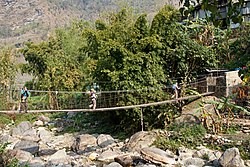Lumle is a town and Annapurna Rural Municipality, Kaski Kaski District in the Gandaki Zone of northern-central Nepal.[clarification needed] At the 1991 Nepal census, it had a population of 4,685 persons in 955 individual households.[1]
Lumle
लुम्ले | |
|---|---|
 Bridge over Dhoti Khola | |
| Coordinates: 28°21′N 83°50′E / 28.35°N 83.83°E | |
| Country | |
| Zone | Gandaki Zone |
| District | Kaski District |
| Population (1991) | |
• Total | 4,685 |
| Time zone | UTC+5:45 (NST) |
| Area code | 061 |


Lumle is well known for its agricultural centre on a hillside above the village founded in 1968 to train British Gurkha ex-servicemen farmers. Its role was expanded in 1975 to benefit the communities from which Gurkhas were recruited in Mid-West Hills. It is now part of Nepal Agricultural Research Council.[2]
Localities
editEducational institutions in Lumle
edit- Balmandir Community School (community)
- Future Star English Boarding School (private)
- Shree Siddha Lower Secondary School (government)
- Shree Sangam Secondary School (government)
- Srijana Secondary School (government)
- Shree Paudurkot Lower Secondary School (government)
Climate
edit| Climate data for Lumle, elevation 1,738 m (5,702 ft), (1991–2020) | |||||||||||||
|---|---|---|---|---|---|---|---|---|---|---|---|---|---|
| Month | Jan | Feb | Mar | Apr | May | Jun | Jul | Aug | Sep | Oct | Nov | Dec | Year |
| Mean daily maximum °C (°F) | 13.9 (57.0) |
15.8 (60.4) |
19.8 (67.6) |
22.8 (73.0) |
23.5 (74.3) |
24.0 (75.2) |
23.8 (74.8) |
23.9 (75.0) |
23.3 (73.9) |
21.6 (70.9) |
18.4 (65.1) |
15.2 (59.4) |
20.5 (68.9) |
| Daily mean °C (°F) | 9.3 (48.7) |
11.2 (52.2) |
14.7 (58.5) |
17.6 (63.7) |
18.9 (66.0) |
20.4 (68.7) |
20.8 (69.4) |
20.8 (69.4) |
19.9 (67.8) |
17.3 (63.1) |
13.9 (57.0) |
10.7 (51.3) |
16.3 (61.3) |
| Mean daily minimum °C (°F) | 4.7 (40.5) |
6.5 (43.7) |
9.5 (49.1) |
12.4 (54.3) |
14.3 (57.7) |
16.7 (62.1) |
17.8 (64.0) |
17.6 (63.7) |
16.5 (61.7) |
12.9 (55.2) |
9.3 (48.7) |
6.1 (43.0) |
12.0 (53.6) |
| Average precipitation mm (inches) | 34.9 (1.37) |
51.4 (2.02) |
68.5 (2.70) |
122.8 (4.83) |
309.4 (12.18) |
866.0 (34.09) |
1,473.2 (58.00) |
1,419.4 (55.88) |
903.2 (35.56) |
208.0 (8.19) |
19.7 (0.78) |
15.5 (0.61) |
5,492 (216.22) |
| Source: Department of Hydrology and Meteorology[3] | |||||||||||||
References
edit- ^ "Nepal Census 2001". Nepal's Village Development Committees. Digital Himalaya. Archived from the original on 12 October 2008. Retrieved 30 September 2008.
- ^ "Welcome | NARC Nepal". narcnepal.org. Retrieved 3 February 2024.
- ^ "PRECIPITATION NORMAL (MM) (1991-2020)" (PDF). Department of Hydrology and Meteorology. Archived from the original (PDF) on 14 October 2023. Retrieved 14 October 2023.
External links
edit

